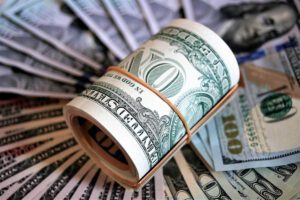
The U.S. dollar is stable against the euro and getting stronger against the yen and the pound sterling during trading on Friday.
The ICE-calculated index showing the dollar’s dynamics against six currencies (euro, Swiss franc, yen, Canadian dollar, pound sterling and Swedish krona) added 0.07% during trading, while the broader WSJ Dollar Index gained 0.08%.
The euro/dollar pair is trading at $1.0835 as of 7:15 a.m. Ksk, up from $1.0833 at market close Thursday.
The pound/dollar exchange rate fell to $1.2382 from $1.2391 the day before.
Traders continue to follow the statements of U.S. Central Bank executives, who are mostly in favor of further raising the benchmark interest rate, despite signs of a weakening U.S. economy.
European Central Bank (ECB) governor Christine Lagarde also made clear that the regulator has no plans to relax its efforts in the fight to return inflation to target levels.
“Inflation by all measures, from every angle you look at it, is excessively high,” Lagarde said at an economic forum event in Davos. – “We will stick with our current policy course until the point where keeping rates at levels that limit economic activity proves to be long enough to ensure that inflation returns to 2%.
The dollar is at 129.10 yen against the yen at 128.43 yen in the previous session.
The yen was getting cheaper on Friday, correcting after a strong rise the day before, despite data on an acceleration of inflation in the country, raising expectations of changes to the monetary policy by the Bank of Japan.
Consumer prices in Japan excluding fresh food (a key indicator tracked by the country’s central bank) rose 4 percent in December from the same month a year earlier, the fastest pace since December 1981, data from the country’s Ministry of Internal Affairs and Communications showed.
The figure exceeded the Bank of Japan’s 2 percent target for the ninth consecutive month.
Overall inflation in Japan last month was also 4% year on year, accelerating from 3.8% in November. The rate was the fastest since January 1991.

Ukraine’s ferroalloy plants were loaded by 30% in 2022, executive director of the Ukrainian Ferroalloys Association UkrFA Serhiy Kudryavtsev said on the association’s website.
According to him, the entire Ukrainian MMC, ferroalloys and mining companies in the industry were severely affected by the consequences of the military aggression against Ukraine.
Kudryavtsev noted that missile strikes on the Ukrainian energy infrastructure late last year significantly worsened the situation for the ferroalloy industry, which depends on a stable energy supply the most. As a result of these strikes, the enterprises of the industry temporarily partially or completely stopped working.
He specified that the situation at NFP and ZPF is difficult – the enterprises operate with minimal workload. Plants are in a balancing market, the moment can increase or decrease the amount of power supply.
As Ukrainian News earlier reported – in 2022 Ukraine reduced the ferroalloys exports by 47.7% YoY – to 349.560.000 tons.
The business of Stakhanov and Zaporizhzhya ferroalloys plants (NWF and ZZF) was organized by PrivatBank (Kiev) before the nationalization of the financial institution. Nikopol Ferroalloy Plant is controlled by EastOne Group, created in the fall of 2007 as a result of restructuring of Interpipe Group, as well as Privat Group.

The Ministry of Education and Science has presented a draft procedure for admission to universities in 2023 on the basis of the improved national multi-subject test (NMT).
“Today, the single instrument of admission is an external independent assessment, but taking into account the security situation, we model the safest possible admission, take into account the opinion of parents and applicants, and submit to the Verkhovna Rada a jointly coordinated admission model under the improved national multi-subject admission test 2023,” said Minister of Education and Science Sergey Shkarlet at a briefing on the model admission campaign in 2023 on Friday.
In particular, the advanced national multidisciplinary test will consist of two compulsory subjects: Ukrainian language and mathematics, and one subject of your choice: history of Ukraine, a foreign language (English, French, German or Spanish), physics, chemistry or biology (you will have to choose when registering for the NFT).
The duration of testing will be 180 minutes, which will include three blocks of subjects, and the time can be distributed by blocks independently.
There will be 30 test tasks in Ukrainian language, history of Ukraine, chemistry and biology, 32 tasks in foreign languages, 22 tasks in mathematics and 20 tasks in physics.
The innovation of taking the NMT in 2023 will be the introduction of a minimum passing score, which will be equal to at least 10% for each subject, depending on the maximum number of points that will be offered for a particular test option.
According to the draft, applicants will be admitted to the competitive selection for places of state (regional) order and may be recommended or transferred to such places if they have a competitive score of at least 130 (for children of deceased defenders of Ukraine this condition does not apply).
Competitive score for admission on the basis of secondary general education and educational and professional degree of professional minor can not be less than 150 points for specialties “dentistry”, “medicine”, “pediatrics” area of knowledge “health”, can not be less than 140 points for specialties areas of knowledge “law”, “public administration and administration”, “international relations”, specialty “pharmacy, industrial pharmacy”.
According to the rules, applicants for art and sports specialties will have to pass the NMT and creative competition.
In addition, the ministry reports that instead of the results of NMT 2023 it will be possible to use the results of NMT 2022 or Independent External Evaluation (IEE) 2020/2021.
Applicants for admission to the master’s degree will be counted according to the results of the unified entrance examination (UCE) – test of general educational competence and foreign language test for all specialties, and the unified professional entrance test (UPT) (in the specialties “social and behavioral sciences”, “journalism”, “management and administration”, “law”, “public administration and administration”, “international relations”) or professional examination in the educational institution for entry into other specialties.
Besides, it will be possible to register for a contract on the basis of a complete general secondary education, an educational and professional degree of professional associate bachelor and an educational degree of bachelor for the specialties with special support (53 specialties and 11 specializations) without external exams (NFT, EBE, EPBE), but only on the basis of the entrance exams in the institution of higher education.
The minister noted that registration for NMT-2023 will begin in April.
Applicants will be able to submit up to 20 applications for all sources of funding and grounds of admission, of which no more than 5 applications for places of state or regional order.
“We have agreed on the position that all privileged categories, participants from the temporarily occupied territories, de-occupied territories will have the opportunity to enter the distance model of their choice. And for three months they will have to conclude a contract by coming to the institution of education to study, “- added Shkarlet.
The 2023 admission campaign will not use the average scores of previously received educational documents and the rural factor, and the industry factor will be used to support applicants on the basis of a complete general secondary education and educational and professional degree of professional associate degree with a priority choice of one of the specialties, which is given special support. The regional coefficient will be determined in the spring depending on the military and political situation in Ukraine.
As well as last year, a separate category for admission remain military education institutions and institutions with special conditions of training, admission to which will be carried out according to their own rules of such institutions.
According to the head of the Verkhovna Rada Committee on Education, Science and Innovation Sergei Babak, a bill with the specified admission procedure for 2023 will be adopted at the next meeting of Parliament.

Oil prices rose on Friday, finishing on the rise for the second week in a row, thanks to investors’ optimism about oil demand in China.
Refining companies in China increase their purchases of oil, hoping for an increase in energy consumption in the country after the lifting of quarantine restrictions, notes Bloomberg.
“Prices are rising amid continued optimism about China’s prospects,” said Charu Chanana, an analyst at Saxo Capital Markets in Singapore. – Signals that the country’s COVID-19 incidence has peaked reinforce expectations for a more sustained rise in demand.”
March Brent crude futures on London’s ICE Futures exchange stood at $86.26 a barrel by 7:15 a.m. Friday, up $0.1 (0.12%) from the previous session’s close. Those contracts rose $1.18 (1.4%) to $86.16 a barrel at the close of trading on Thursday.
The price of WTI futures for February at electronic trades of the New York Mercantile Exchange (NYMEX) increased by that time by $0.17 (0.21%) up to $80.5 per barrel. By closing of previous trades the cost of those contracts grew by $0.85 (1.1%) to $80.33 per barrel.
The previous day the US DOE data showed an unexpected and sharp increase of oil reserves in the USA. The indicator grew by 8.41 mln barrels up to 4483.02 mln barrels while experts interviewed by Bloomberg expected a 3 mln barrel decline of reserves.
Gasoline inventories rose 3.48 million barrels, compared to an expected increase of 2.4 million barrels.
“The inventory data was significantly different from what the market was expecting,” said Tyche Capital Advisors expert Tariq Zahir. – Nevertheless, we expect prices to rise further given the opening of the Chinese economy, the situation in Ukraine (Russia’s full-scale war against Ukraine – IF) and the fact that the US government needs to replenish the strategic oil reserve.”

Ukraine in 2022 decreased imports of nickel ores and concentrates in physical terms by 71.9% year-on-year to 346,719 thousand tons.
According to statistics released by the State Customs Service (SCS), in monetary terms, imports of nickel ores decreased by 73.8% to $15.428 million during the period.
Imports were from Guatemala (100% of shipments in monetary terms).
For 2022, like in 2021, Ukraine did not export or re-export these products.
As reported, Ukraine in 2021 reduced imports of nickel ores and concentrates in volume terms by 20.6% compared to 2020 – to 1 million 235.533 thousand tons. In monetary terms, imports of nickel ores decreased by 22.2% to $58.929 million. Imports were from Guatemala (100% of deliveries in monetary terms).
In 2021, Ukraine did not export or re-export this product.
Ukraine imports nickel ore from Pobuzhsky Ferronickel Plant (PFK, part of Solway Group).
PFC processes about 1.2 million tons of ore per year.

Together with partners, the Charitable Fund for Reconstruction and Development of Ukraine is planning to supply 52 full-fledged mobile hospitals equipped for surgeries and laboratory diagnostics in the immediate vicinity of active hostilities to the country.

As Artem Honcharenko, President of the Fund, said during a press conference at Interfax-Ukraine on Tuesday, the first hospital has already been committed to the Ministry of Defense and provides medical assistance to the military and civilian population in the area of active hostilities.
“The first hospital helps where there are active hostilities and heavy losses are possible. It is still the only one on the entire front line and is already saving lives. It is 52 hospitals that will help provide quick assistance along the entire front line in those places where quick assistance is needed,” he said.
Honcharenko specified that the number of hospitals was determined after consultations with military experts, including NATO ones. However, hospitals may have different specifications.
“The price at which such a hospital is offered on the market is $360,000, but in negotiations with manufacturers, we came up with a price of EUR 232,000 plus additional transportation costs,” Honcharenko specified.
At the same time, he added that by now an advance payment of $40,000 had been made – “under my personal word of honor,” and the hospital had been brought to Ukraine, but fundraising continues. Currently, the flow of patients served by it is 100-150 people a day – both military and civilian, who are in gray zones and places of de-occupation. Medical care in the hospital is provided by military doctors, who have already been joined by civilians.
“The hospital can operate in 300 km of the border zone, where the aggressor’s missiles reach. This is a full-fledged hospital on wheels,” Honcharenko said.
He noted that the hospital can be deployed and start working within 15 minutes, it is completely autonomous, equipped with a generator and has the ability to connect to external power. The Fund is currently exploring the possibilities of assembling hospitals in Ukraine.
The second hospital, according to the head of the charitable organization, the Fund plans to transfer to the clinic and medical center of the western region – “this is the so-called Lviv hospital.”
“We have signed a memorandum with them. We planned to transfer the first hospital to them, but we were asked to transfer it for special operations, so the first hospital operates where active hostilities are taking place,” Honcharenko specified.
According to Ukraine’s Armed Forces soldier Danyil Honcharenko, who has three wounds, due to the change in the operational situation at the front, the need for mobile hospitals capable of providing full-fledged medical care directly on the front line has increased significantly.
At the same time, another participant in the press conference, lawyer and serviceman Serhiy Petkov, noted their importance not only during active hostilities – after the victory they can continue to work in the aftermath of man-made disasters, accidents and terrorist attacks.

“If such a mobile hospital were in Dnipro on January 14, then more people could be saved before they were sent to hospitals, providing them with timely assistance on the spot,” he stressed.
Olena Kreknina, representative of the Dnipro Reconstruction and Development Foundation, spoke about cooperation with entrepreneurs.
“Raising funds for mobile hospitals is the most important area for us. We are engaging the business community, including the window business in Dnipro and companies such as AXOR, which has already joined. I urge all business representatives to join in saving lives, those who bring our victory closer,” she said.
According to the information announced during the press conference, the partners of the mobile hospitals project were the PR-agency Be my media, the Club of Experts, the Association of Science and Education of Ukraine, the National Guard of Ukraine, the Main Intelligence Agency of the Ministry of Defense of Ukraine, NGO Culture and Heritage of Ukraine, the International Technology Transfer Association (ITTA), the National University of Construction, the Physical culture and sports society Dynamo Ukraine, the licensed online school Focus, PATprofi – IT, Donbasenergo, the Amor Ukraine Health Organization, and NGO Ukrainian Diabetic Federation.
ARTEM_HONCHARENKO, CONFERENCE, EXPERTS_CLUB, FUND_FOR_RECONSTRUCTION_AND_DEVELOPMENT_OF_UKRAINE, HOSPITAL, MOBILE